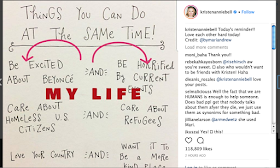I have a definite soft spot in my reading habits for good running memoirs, since it's a sport I have an abundance of appreciation for. I also have a vested interest, since I try to get in three or four runs a week, although I'm not currently training for anything. I don't have ambitions of every being fast, but it's good for me mentally and physically, so I try to stay consistent. When that drive wanes I generally find myself reading a good running memoir to help on the motivation side of things.
While recently reading Deena Kastor's book, Let Your Mind Run: A Memoir of Thinking My Way to Victory, it occurred to me how applicable the lessons from these types of books are to life in general. There was so much sandwiched into her running philosophy that I could apply to teaching, parenting, and other obstacles that pop up from time to time. Why it's taken me over a decade of running and probably a dozen or two books like to realize this is beyond me.
For those who are runners, have been runners, have tried running, or completely shun it, no one can dismiss the fact that it's tough. It doesn't matter if you're a recreational jogger who just laces up on weekends or a professional track star with endorsement deals. Running taxes your cardiovascular system, puts pressure on your joints, strains your muscles, and challenges your mind (especially for those of us who use treadmills or run the same routes continuously). A lot of the principals and practices runners use, or at least try to, are not only applicable when exercising, though, they come in handy when trying to tackle other challenges as well.
Positive Thinking- A huge section of Kastor's book deals with training your brain, not just your legs. She spent a lot of time focusing on gratitude, seeing the positive, and focusing on what she had control over. She embraced her competitors and knew setbacks along the way would just serve to make her stronger. This isn't unique to Kastor, countless other memoirs I've read have also emphasized this approach and discuss how hard it really is to stop negative self-talk.
Utilize Discomfort- While running shouldn't make you feel like you are injured, pain definitely pops up, whether it's from aching muscles, the need for new shoes, chafing, etc... Pain often makes us stronger though, especially when we are trying to become faster or increase endurance. The pain is actually a good thing, since it signals the fact that the tears that have been created in muscles are healing and becoming stronger. If we always stop when we feel pain there can be no growth or improvement (although you have to be careful- if it's a sharp pain or super consistent see you doctor, as I am most definitely not one).
Goal Setting- Runners constantly have goals, whether it's related to speed, mileage, number of runs, types of runs, or race performance. Most of the runners I've read books by or know in real life tend to be pretty realistic about how much they're able to push themselves and what they need to do to get there. Things may not always work out, but there is usually forward motion, both literally and mentally.
Perseverance- I have run many, many races over the years and by the time I have finished 13.1 miles I can typically count on less than two hands how many people I see camped out in aid stations (out of tens of thousands of people). Sure, everyone has to modify their plans during a run sometimes, but the only way to improve or finish is to persevere.
Efficient Routines- All of the memoirs I have read, by greats like Kastor, Kara Goucher, Dean Karnazes, Matt Fitzgerald, and Hal Higdon, all maintain running schedules that maximize efficiency. There are days for speed work, for fartleks, mile repeats, and long runs, all depending on the goal of the runner. For some of us, our running routines are much more simple and are more along the lines of "I will run for thirty minutes four times a week with some intervals thrown in at least once." Fitness fades fast, so running is an activity that you have to be consistent about.
Positive thinking, utilizing discomfort, goal setting, perseverance, and creating efficient routines aren't concepts that are unique to running, they're just ones that show up frequently. These are all attributes that I can encourage my students to adapt when it comes to things as focused as an essay or as broad as how they pursue their educational careers. They're concepts I am already trying to instill in my four-year-old when it comes to simple things like practicing tracing or putting his socks on. Personally, they're all things I strive for daily- strive being the key word. When it comes to my actual non-running life I know I could definitely use a crash course when it comes to positive thinking, and when it comes to running I need to work on pushing through the pain a bit better.
Basically, I use running books for my own version of self-help. They motivate me to add miles to my exercise routine, but they also give me a fresh perspective and remind me that you just have to work harder to get to where you want to be.
And just in case I've convinced you to either take up running or at least utilize the philosophy encouraged in most running memoirs, here are some of my favorites to get started:
Let Your Mind Run by Deena Kastor
The Long Run by Catriona Menzies-Pike
The Long Run by Matt Long
Marathon by Hal Higdon
An Accidental Athlete by John Bingham
Running for Women by Kara Goucher
Born to Run by Christopher McDougall














